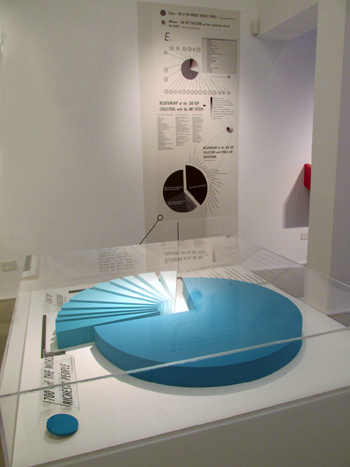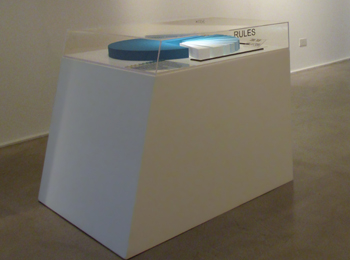ARTWORKS / PROJECTS


Critical Texts:
Capital
On/scenities
by Teresa Riccadi
Art&Capital
by Silvia Litardi
Speculationis
by Marìa Fernanda Cartagena
Performing
in the Theatre of The Auction House
by Gabriela Salgado
other
More information:
Museum
of Political Economy of Art
Auctions,
Market & Money
ArtAuctionMarket en Flickr
Dispari & Dispari
|
Description:
Plus-Valía is a model of reflection on the interacting processes in the construction of economic/symbolic value dimension in art.
The object exhibits the diverse roles, percentages and domains of the 200 most representative art collectors in the world. The research is based on that in the same year the magazine Artnews presents as the "top 200 collectors", in turn included in the list of the 700 richest people in the world published by Forbes. The piece shows his participations in the field of art, his foundations or private museums, his philanthropic centers, his positions in boards of public museums, as sponsors of biennials, etc.

Plus-valía [Surplus Value] (2012)[1] , a statistical
display* laid out like a pie chart – dialogues with
the other piece that expands upon the concept. The first piece
provides a set of monochrome values about variation and distribution
of hegemony, collecting and the museum (its public and private
status), whereas the second piece lays out a set of relations
that, from indicators in this space, show not only the 200
top collectors and their 25 most lucrative businesses, but
also their combinatory forms in percentages associated with
their participation on museum boards, the museums themselves,
those that have foundations, and finally, the philanthropists.
Surplus Value (2012) documents, measures, and gives scaled
visibility to the growing dependence on the market, the pornographic
on/scenities between art and capital.
excerpt by Capital
On/scenities
by Teresa Riccardi
[1] Plus-valía [Surplus Value] finds an antecedent
in Herrero’s 1997 work Mi Botín [My Booty], in
which the notions of ‘extractivism’ and collecting
are connected as founding/instituting ones, from a post- colonialist
and ‘museumized’ perspective.
*[English in original – trans.]
|